Up-regulation of Retrograde Response in yeast increases glycerol and reduces ethanol during wine fermentation

Up-regulation of Retrograde Response in yeast increases glycerol and reduces ethanol during wine fermentation
Garrigos, V.; Vallejo, B.; Molla-Marti, E.; Picazo, C.; Peltier, E.; Marullo, P.; Matallana, E.; Aranda, A.
AbstractNutrient signaling pathways play a crucial role in regulating the balance between metabolism, growth, and stress in response to the available food supply. They are determinant for the biotechnological success of the yeast Saccharomyces cerevisiae during food-producing fermentations. One such pathway is the Retrograde Response, which controls the use of carbon backbones for the synthesis of amino acids derived from alpha-ketoglutarate, such as glutamate and lysine. The repressor MKS1 is linked to the TORC1 complex and negatively regulates this pathway. Deletion of MKS1 on a variety of industrial strains causes an increase in glycerol in winemaking, brewing and baking conditions. This increase is accompanied by a reduction in ethanol production in grape juice fermentations in four commercial wine strains. Interestingly, this does not lead to an increase in volatile acidity, as the levels of acetic acid actually decrease. Aeration during winemaking usually increases acetic acid levels, but this effect is reduced in the MKS1 mutant. Although there is an improvement in the metabolites of oenological interest, it comes at a cost, as the mutant showed slower fermentation kinetics when grown in grape juice, malt, and laboratory media using glucose, sucrose, and maltose as carbon sources. The deletion of RTG2, an activator of the Retrograde Response that acts as an antagonist of MKS1, also results in a defect in wine fermentation. These findings suggest that the misregulation of this pathway causes a fitness defect. Therefore, manipulating the repressor MKS1 is a promising approach to modulate yeast metabolism and produce low-ethanol drinks.